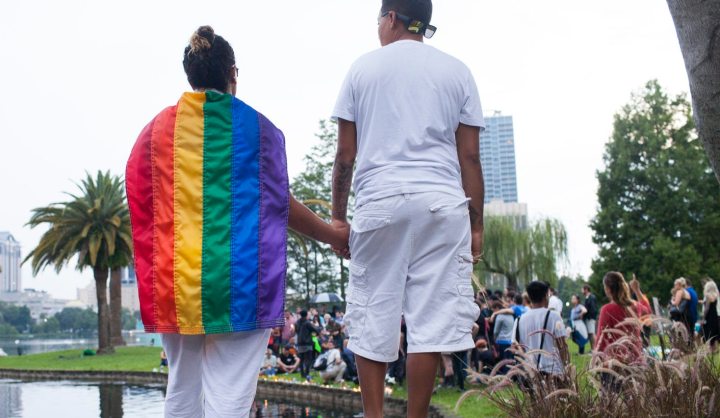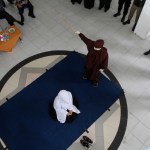Maverick Life, World
Stock-taking times: Religion’s role in Orlando massacre

In yet another senseless shooting spree, the biggest in US history, 49 people have lost their lives in Pulse, a gay nightclub in Orlando, Florida. In the early hours of Sunday morning Omar Mateen opened fire on those who were dancing the night away. IS claimed responsibility for the killing. In the aftermath of the killing a number of religious people took to social media to condemn homosexuality. Appallingly, one called it “good news”. Guns and terrorism will, no doubt, be debated in the coming days and weeks. But what role does religion play in the persecution and suffering of gay people? By RUSSELL POLLITT.
Gay-bashing has often found its justification in religious traditions. It’s an unfortunate pitfall that many believers fall into: the propensity to see themselves as the ultimate guardians of morality and in so doing demonise anyone that is “other” – or does not fit their narrow (often flawed) understanding, and categories. This has been further compounded by the language that is used in religious traditions. Naively, I was shocked to read some of the reactions – by so-called believers – in the aftermath of the horrific killings at Pulse.
Fr. Edward L Beck, writing in Cruxnow.com, describes how he spoke out against what had happened on Sunday morning as news broke across the world of the killings in his Sunday sermon. One congregant left his church, agreeing with him. This was a “terrible tragedy”. However, she went on to say, “If they hadn’t been in a place like that at two in the morning, they would still be alive.” I read the line twice to make sure I had comprehended it correctly. Beck goes on to say that he was “dumbfounded, literally speechless”.
Beck continues: “In fairness, I don’t believe she was saying that the scores killed and injured deserved it, or were directly responsible for their fate, but the implication was almost as chilling: If those in the Pulse nightclub hadn’t been socialising in a gay – and therefore, in her view, immoral – environment in the middle of the night, their lives would have been spared.”
Beck explains that, in the face of the astonishing reaction his congregant displayed, he went to social media to try to process this. Most empathised with dismay but there were some responses, he writes, which surprised him. “One person tweeted: ‘Saying LGBT relationships are ‘intrinsically disordered’ and ‘morally evil’ incites hatred worldwide not love… Catholic teaching on LGBT is part of the problem. It fuels hatred and bigotry worldwide. It kills LGBT hearts.’”
It’s an uncomfortable question but one that believers have to ask: What role has religion played (across the board) in fuelling homophobia? I suspect the answer will be equally uncomfortable.
The Catechism of the Catholic Church (which is the tradition I am familiar with but suspect that other traditions are not dissimilar) says “tradition has always declared that homosexual acts are intrinsically disordered”. It refers to homosexuality as an inclination which is “objectively disordered”. Most people stop reading there but it does go on to say that gay people “must be accepted with respect, compassion, and sensitivity. Every sign of unjust discrimination in their regard should be avoided.”
It is not uncommon for gay people to feel unwanted and not welcome in Christian communities. Sometimes their families feel too embarrassed to go to church, or in worst case scenarios, are shunned because of their gay family member. Gay people and their families have been treated as second-class citizens. Many gay people were never physically driven away from a church – the language alone was enough.
This kind of language came under scrutiny at the Synod on the Family, called by Pope Francis, in 2014. A number of bishops called for a language that is more sensitive but, sadly, many other bishops dug their heels in and would not budge on this issue. Many of the American bishops, and some Africans, were the most vociferous on this subject.
Some of the bishops argued that it was precisely this kind of language that alienated gay people and their families. Some alluded to the fact that this language did not point towards a loving God who welcomes all, no matter who they are.
Writing on family life in his post-Synod Apostolic Exhortation, Amoris Laetitia, the Pope clearly says that “every sign of unjust discrimination” towards gay people must be avoided. He goes on to say, “particularly any form of aggression and violence”. Some people, especially LGBT Catholics, were disappointed that Francis was not stronger on the issue.
The kind of language that is used in official texts of the Church powerfully shapes perceptions, attitudes and actions. After all, isn’t that what religious teaching strives to do – shape perceptions, attitudes and actions – hopefully for the good?
While religion and religious language alone cannot be held responsible for or used as the sole motivating factor for this senseless killing in Florida, believers cannot let this pass. We need to interrogate the impact of the words we use and the positions we take. Religious language, and the mindset it forms, must take stock of its contribution to forming attitudes that contribute to a cocktail that breeds such evil acts. This type of evil can never be associated with God.
Often the Bible is used to justify a range of attitudes and actions. But there is an important fact that is overlooked or ignored: The difference between what is in the Bible and what the Bible teaches. What the Bible teaches is not always reducible to what is in the Bible.
To understand this, we need to look at the Bible as a whole and look at its trajectories and common themes. We need to study the text in its totality and not just read, blindly, what is in the Bible. We should never isolate one section of the text. We must also bear in mind that the texts we read in the Bible were written in certain circumstances, addressing certain issues, and within a certain cultural milieu.
The overarching theme of the Bible, without doubt, is the love of neighbour and care of the poor. Many accounts in the Bible explain what kind of disaster follows when these are not fulfilled. Love of neighbour and care of the poor, by their consistent repetition in both the Old and New Testaments, overwrite all other themes. This overwriting theme should be the lens that informs the perceptions, attitudes and actions of believers.
Pope Francis seems to get this. Speaking to an Italian journalist, who was questioning him on his famous “Who I am to judge?” remark when he was asked about gay priests in 2013, said: “I am glad that we are talking about ‘homosexual people’ because before all else comes the individual person, in his wholeness and dignity. And people should not be defined only by their sexual tendencies: let us not forget that God loves all his creatures and we are destined to receive his infinite love.”
While we should ensure that religion is not used by extremists to justify murder, we have to acknowledge that religious perceptions and attitudes need to be challenged when they fail to position themselves within the authentic vision of a particular religious tradition. Extremists are not only “out there”, they are within our religious communities. Just last week the pope warned that those within the Church who told us “it’s this or nothing” are heretics.
When Christians fail to condemn the killing of gay people at Pulse, they fail to position themselves in the authentic tradition. Bad religion, as a colleague remarked on social media, is an assault rifle.
The US government has failed to deal with the issue of gun control despite multiple shootings in recent years. Equally so, a number of religious traditions have failed to deal with language and attitudes that perpetuate homophobia. That’s a sin too.
If the individual person and their dignity comes first, as Pope Francis has reiterated a number of times, that means it comes first for everyone, migrants, blacks, whites, gays, straights. There are no exceptions.
In the days ahead there will be vigorous debates in the political arena about guns and how freely available they are in the US. It’s the same story every time one of these tragedies unfolds.
But there is another place where urgent discussion is needed: in the faith community. I hope that the Christian community will have the courage to face up to its part in shaping perceptions, attitudes and actions that have contributed to the persecution and suffering of gay people by perpetuating homophobia. We need to call it what it is: wrong.
When religion, or anything for that matter, is distorted and used by extremists for their own ends, it needs to be condemned. When it is distorted and used by some believers for their own ends, it needs to be condemned, even more urgently. DM
Photo: Yesenia Rosa and Leslie Soto hold hands during a vigil to honor the victims of a mass shooting at a nightclub, at Eola Lake Park in Orlando, Florida, USA, 12 June 2016. At least 50 people were killed and 53 were injured in a shooting attack at an LGBT club in Orlando, Florida, in the early hours of 12 June. The shooter, Omar Mateen, 29, a US citizen of Afghan descent, was killed in an exchange of fire with the police after taking hostages at the club. EPA/RYAN STONE.




















 Become an Insider
Become an Insider